
INIBIÇÃO DA PEÇONHA DE Bothrops alternatus (URUTU) ‘IN VIVO’ PELO PRINCIPIO ATIVO ISOLADO VEGETAL LUPEOL
A maioria dos acidentes ofídicos
no Brasil ocorrem com serpentes do gênero
Bothrops. A peçonha botrópica é constituída
de enzimas e toxinas não enzimáticas, que
atuam sinergicamente, provocando severos
danos teciduais locais como edema, dor
intensa, sangramento e necrose severa.
Metabólitos secundários vegetais tem sido
cada vez mais estudados como inibidores
de toxinas encontradas em peçonhas de
serpentes. Neste contexto, o presente trabalho
visou avaliar a inibição do dano causado pela
peçonha de Bothrops alternatus, utilizando
amostras resultantes da incubação da peçonha
bruta (20μg) com o princípio ativo Lupeol,
nas concentrações de 1:20 e 1:50, (m/m). Os
resultados permitiram perceber que o Lupeol
apresenta a capacidade de inibir algumas das
toxinas presentes na peçonha que provocam
hemorragia e necrose.
INIBIÇÃO DA PEÇONHA DE Bothrops alternatus (URUTU) ‘IN VIVO’ PELO PRINCIPIO ATIVO ISOLADO VEGETAL LUPEOL
-
Palavras-chave: Inibição, Lupeol, Necrose, Peçonha.
-
Keywords: Inhibition, Lupeol, Necrosis, Venom.
-
Abstract:
Most ophidian accidents in Brazil
occur with Bothrops snakes. The botropc
venom consists of non-enzymatic enzymes and
toxins that act synergistically, causing severe
local tissue damage such as edema, severe
pain, bleeding, and severe necrosis. Vegetal
secondary metabolites have been increasingly
studied as inhibitors of toxins found in snake
venoms. In this context, the present work aimed
to evaluate the inhibition of the damage caused
by the venom of Bothrops alternatus, using
samples resulting from the incubation of the
crude venom (20μg) with the active principle
Lupeol at ratio of 1:20 and 1:50 (w/ w). It was
possible to notice that Lupeol is able to inhibit
the some toxins present in the venom causing
hemorrhage and necrosis.
-
Número de páginas: 15
- Klaus Casaro Sturnino
- Vanderlúcia Fonseca de Paula
- Mirian Machado Mendes
- BENEDITO MATHEUS DOS SANTOS


